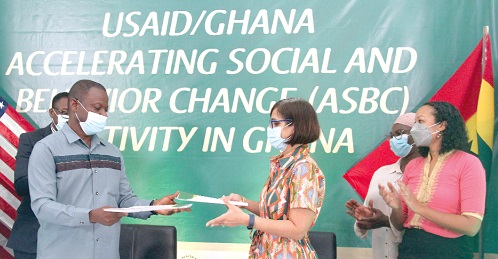
GHS, USAID sign MoU on behavioural change project
The Ghana Health Service (GHS) has signed a memorandum of understanding (MoU) with the United States Agency for International Development (USAID) for the implementation of a social and behavioural change project for better health outcomes.
The project, dubbed: “USAID-Ghana accelerating social and behavioural change (SBC) activities in Ghana”, is aimed at promoting health-seeking behaviours to improve the well-being of people in 17 districts in the northern part of the country.
Advertisement
The five-year project, which will be implemented at a cost of about $29.13 million, will be spearheaded by the Health Promotion Division of the GHS till December 2026.
The project will not only accelerate healthy norms and behaviours among the people but also build the capacity of health promotion officers at the national, regional and district levels to effectively design, coordinate and implement SBC interventions in the 17 zones of interest (ZOIs).
Significance
The Director-General of the GHS, Dr Patrick Kuma-Aboagye, who signed for the country, said social and behavioural change activities were critical to improve awareness of the people of issues of behaviour for specific health outcomes.
He expressed appreciation to the USAID for its immense support to healthcare delivery in the country, including the fight against the COVID-19.
“This agreement is a significant milestone in our ongoing collaboration. For years, USAID has partnered us to deepen collaborations at advancing healthcare delivery to improve health outcomes among the people.
“Without doubt, the COVID-19 pandemic has dramatically impacted our world, changed the way we deliver health services and reminded us, time and time again, that infectious disease control and vaccination efforts require awareness and motivated people to adopt and regularly perform key health behaviours to protect lives,” he added.
Dr Kuma-Aboagye also said simple acts, such as hand-washing at key times, prompt treatment-seeking behaviour and positive provider and client interactions, reduced the contraction of diseases.
The Director of the Health Promotion Division at the GHS, Dr Dacosta Aboagye, said there was the need to accelerate social and behavioural change in the country by educating the people to adopt safety norms for good health outcomes.
Adoption
The Director of the Health, Population and Nutrition Office of USAID/Ghana, Dr Zohra Balsara, who signed for the USAID, said the project would help increase and sustain the adoption of healthy behaviours and practices in beneficiary communities.
According to her, “73 per cent of households own a bed net, but only half of children under five and pregnant women sleep under the nets. We may give individuals the resources and information to make healthy choices, but unless we understand the factors that inhibit or motivate the adoption of a behaviour, we will not make lasting behavioural change”.
Dr Balsara also said health promotion was the foundation of all successful health interventions, for which reason the USAID would continue to rely on the leadership and expertise of the GHS to ensure that every person in Ghana was informed and empowered to make healthy decisions.



